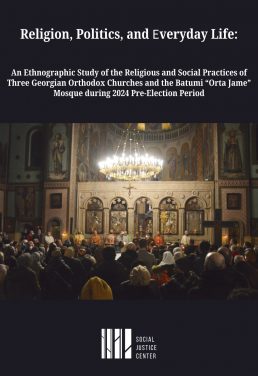საერთო ცხელი ხაზი +995 577 07 05 63


Number Of Pages: 77
Publication Year: 2025
Authors:
Introduction
In contemporary Georgian society, trust in religious organizations has been steadily increasing. According to the Caucasus Barometer survey of 2021, 63% of Georgia’s population trusted religious institutions[1], while by 2024,[2] 73%[3] of the population trusted the religious institution to which they belonged. Today, for a large segment of Georgia’s population, religious organizations are considered as the most reliable and authoritative institutions, whereas trust in the executive,[4] parliament,[5] presidency,[6] judicial system,[7] and political parties,[8] remains significantly lower.
The Georgian Orthodox Church was annually financed with 25 million GEL[9] from the state budget. In March 2024, however, an additional 35 million GEL was allocated[10] in the state budget for the Patriarchate’s educational projects. Accordingly, in 2024 the total funding of the Georgian Patriarchate amounted to 60 million GEL. According to the Prime Minister of Georgia, the increase in funding “is not connected to the elections.”[11] Nevertheless, granting financial privileges to the Georgian Orthodox Church raises risks of instrumentalizing religion for political legitimation and may pose a threat to the institutional autonomy of the Church. It is noteworthy that, according to the State Agency for Religious Issues, starting from 2024, the funding of four other religious organizations increased by 1 million GEL, amounting to 6.5 million GEL.[12]
In 2024, the Georgian Government continued the practice of handing over land plots to the Georgian Orthodox Church at a symbolic price of 1 GEL.[13] At the same time, the construction of Batumi’s new mosque has been delayed for years[14], which underscores the problems and unequal conditions faced by religious minorities in the country.
Taking this into account, the Georgian Orthodox Church is in a financially privileged position compared to other religious organizations in Georgia. In fact, since 2002, when the Constitutional Agreement between the State of Georgia and the Apostolic Autocephalous Orthodox Church of Georgia was signed[15], the Georgian Orthodox Church, as the dominant religion, acquired additional privileges through the act of cooperation with the state (Wheatley 2005).
Against the background of the Patriarchate’s privileged status and the high level of public trust it enjoys, it is crucial to assess the relationship between politics and religious institutions, especially during such critical periods for the country as elections. Specifically, it is necessary to determine the extent of influence of politics on the religious agenda, to establish how representatives of religious institutions participate in political discourse, and, in the case of ruling party members, to evaluate how they attempted to leverage the resources and authority of religious organizations for electoral purposes.
This report presents an ethnographic study of the environment within religious institutions in Georgia during the 2024 pre-election period. Drawing on the examples of the Georgian Orthodox Church and the Batumi “Orta Jame” Mosque, the study examines prevailing attitudes and political narratives circulating within religious spaces. The primary focus is on Sunday sermons, which, alongside discussions of religious doctrines, often incorporate commentary on social and political issues. Sermons are analyzed as a medium through which the consciousness of congregants is shaped. Accordingly, this research explores how representatives of religious institutions reflect upon ongoing social and political developments in Georgia during their preaching. The study also examines the ways in which religious narratives are interwoven with political messages. It analyzes both the latent and explicit messages in sermons that resonate with the main electoral narratives of the ruling party. In addition, the report describes the reflections of believers on the sermons (their perceptions and interpretations).
[1] See: The answers “Trust more than distrust”(36%) and “Fully trust”(27%) were combined. (Last accessed: 14.04.2025). link
[2] See: link (Last assessed: 14.04.2025)
[3] See: link The responses „I rather trust than distrust“ (34%) and „I fully trust“ (39%) were combined. (Last accessed: 14 April 2025)
[4] See: link Trust: 31%. The responses „Rather trust than not trust“ (21%) and „Fully trust“ (10%) were combined. (Last accessed: 14.04.2025)
[5] See: link Trust: 22%. The responses „Rather trust than not trust“ (15%) and ‘Fully trust’ (7%) were combined. (Last accessed: 14.04.2025)
[6] See: link Trust: 26%. The responses „Rather trust than not trust“ (20%) and ‘Fully trust’ (6%) were combined. (Last accessed: 14.04.2025)
[7] See: link Trust: 23%. The responses „Mostly trust“ (16%) and „Fully trust“ (7%) were combined. (Last accessed: 14.04.2025)
[8] See: link Trust: 12%. The responses ‘Mostly trust’ (9%) and ‘Fully trust’ (3%) were combined. (Last accessed: 14.04.2025)
[9] See: Civil Georgia. (2024, March 19). “The government increased funding for the Patriarchate.” link (Last accessed: 19.04.2025)
[10] Decree of the Government of Georgia, N375, March 15, 2024, “on Providing Financial Assistance to Certain Institutions Funded by the Georgian Patriarchate”. link Last accessed: 19.04.2025)
[11] The Prime Minister stated: “This funding was included in this year’s budget last year. Therefore, it has no connection to the elections. This is not a decision made recently, before the elections. For us, it is important that the Patriarchate is able to implement its own projects, especially in the field of education.” Civil Georgia, „The Government increased the Patriarchate’s funding“. link (last accessed: 19.04.2025).
[12] State Agency for Religious Issues of Georgia, „Funding of Religous Organizations Increased“. February 2, 2024. link (last accessed: 03.07.2024)
[13] Decree of the Government of Georgia, N354, March 12, 2024, „on the Privatization of Immovable Property Owned by the State through Direct Sale to the Georgian Apostolic Orthodox Church“. link
[14] See: Social Justice Center, „Batumi New Mosque Case“, June 28, 2023. link (Last accessed: 19.04.2025)
The website accessibility instruction